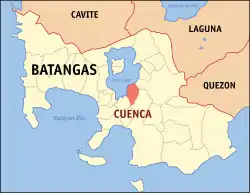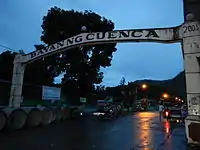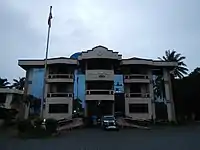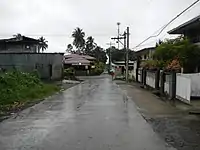Cuenca, Batangas
Cuenca, officially the Municipality of Cuenca (Tagalog: Bayan ng Cuenca), is a 4th class municipality in the province of Batangas, Philippines. According to the 2020 census, it has a population of 36,235 people.[3]
Cuenca | |
|---|---|
| Municipality of Cuenca | |
 | |
 Seal | |
| Nickname: Home of Bakers | |
 Map of Batangas with Cuenca highlighted | |
OpenStreetMap | |
.svg.png.webp) Cuenca Location within the Philippines | |
| Coordinates: 13°55′N 121°03′E | |
| Country | Philippines |
| Region | Calabarzon |
| Province | Batangas |
| District | 3rd district |
| Founded | November 7, 1876 |
| Named for | Cuenca, Spain or Cuenca Province |
| Barangays | 21 (see Barangays) |
| Government | |
| • Type | Sangguniang Bayan |
| • Mayor | Alexander M. Magpantay |
| • Vice Mayor | Aurea P. Pantas |
| • Representative | Ma. Theresa V. Collantes |
| • Municipal Council | Members |
| • Electorate | 25,580 voters (2022) |
| Area | |
| • Total | 58.18 km2 (22.46 sq mi) |
| Elevation | 166 m (545 ft) |
| Highest elevation | 957 m (3,140 ft) |
| Lowest elevation | 5 m (16 ft) |
| Population (2020 census)[3] | |
| • Total | 36,235 |
| • Density | 620/km2 (1,600/sq mi) |
| • Households | 8,923 |
| Economy | |
| • Income class | 4th municipal income class |
| • Poverty incidence | 11.65 |
| • Revenue | ₱ 137 million (2020) |
| • Assets | ₱ 307.3 million (2020) |
| • Expenditure | ₱ 110.8 million (2020) |
| • Liabilities | ₱ 39.73 million (2020) |
| Service provider | |
| • Electricity | Batangas 2 Electric Cooperative (BATELEC 2) |
| Time zone | UTC+8 (PST) |
| ZIP code | 4222 |
| PSGC | |
| IDD : area code | +63 (0)43 |
| Native languages | Tagalog |
History
Once a part of San Jose, it became an independent town under the name "Cuenca" in 1876, after the Spanish hometown of the then-Governor of Batangas that resembles its cold breeze and beautiful scenic spots.[5] Its main tourist attraction is the 700-meter-high (2,300 ft) mountain, Mount Macolod (Mount Maculot).
The Patron of Cuenca is Saint Isidore the Laborer, the patron of farmers. A celebratory feast is held annually every May 15.
Geography
According to the Philippine Statistics Authority, the municipality has a land area of 58.18 square kilometers (22.46 sq mi) [6] constituting 1.86% of the 3,119.75-square-kilometer- (1,204.54 sq mi) total area of Batangas.
Barangays
Cuenca is politically subdivided into 21 barangays.[7] Each barangay consists of puroks and some have sitios.
| PSGC | Barangay | Population | ±% p.a. | |||
|---|---|---|---|---|---|---|
| 2020[3] | 2010[8] | |||||
| 041009001 | Balagbag | 2.3% | 848 | 778 | 0.87% | |
| 041009002 | Bungahan | 5.6% | 2,032 | 1,830 | 1.05% | |
| 041009003 | Calumayin | 0.9% | 326 | 354 | −0.82% | |
| 041009005 | Dalipit East | 1.7% | 609 | 591 | 0.30% | |
| 041009006 | Dalipit West | 1.6% | 593 | 533 | 1.07% | |
| 041009007 | Dita | 12.6% | 4,579 | 4,392 | 0.42% | |
| 041009008 | Don Juan | 2.4% | 885 | 783 | 1.23% | |
| 041009009 | Emmanuel | 5.5% | 1,985 | 2,011 | −0.13% | |
| 041009010 | Ibabao | 9.2% | 3,343 | 3,188 | 0.48% | |
| 041009011 | Labac | 5.6% | 2,037 | 2,096 | −0.29% | |
| 041009012 | Pinagkaisahan | 5.5% | 1,978 | 1,875 | 0.54% | |
| 041009013 | San Felipe | 9.3% | 3,377 | 3,171 | 0.63% | |
| 041009014 | San Isidro | 5.8% | 2,091 | 1,804 | 1.49% | |
| 041009015 | Barangay 1 (Poblacion) | 5.2% | 1,883 | 1,639 | 1.40% | |
| 041009016 | Barangay 2 (Poblacion) | 0.7% | 263 | 376 | −3.51% | |
| 041009017 | Barangay 3 (Poblacion) | 2.0% | 735 | 680 | 0.78% | |
| 041009018 | Barangay 4 (Poblacion) | 2.6% | 930 | 1,022 | −0.94% | |
| 041009019 | Barangay 5 (Poblacion) | 1.0% | 378 | 438 | −1.46% | |
| 041009020 | Barangay 6 (Poblacion) | 1.4% | 513 | 499 | 0.28% | |
| 041009021 | Barangay 7 (Poblacion) | 5.1% | 1,861 | 1,848 | 0.07% | |
| 041009022 | Barangay 8 (Poblacion) | 4.2% | 1,537 | 1,328 | 1.47% | |
| Total | 36,235 | 31,236 | 1.50% | |||
In 1954, Don Juan was constituted as a barrio from the sitios of Lungos ng Parang, Kulit, Lumampao, Pisa, Napapanayan and Lagundian.[9]
Climate
| Climate data for Cuenca, Batangas | |||||||||||||
|---|---|---|---|---|---|---|---|---|---|---|---|---|---|
| Month | Jan | Feb | Mar | Apr | May | Jun | Jul | Aug | Sep | Oct | Nov | Dec | Year |
| Average high °C (°F) | 27 (81) |
28 (82) |
30 (86) |
31 (88) |
30 (86) |
28 (82) |
27 (81) |
27 (81) |
27 (81) |
27 (81) |
27 (81) |
27 (81) |
28 (83) |
| Average low °C (°F) | 18 (64) |
18 (64) |
19 (66) |
20 (68) |
22 (72) |
23 (73) |
22 (72) |
22 (72) |
22 (72) |
21 (70) |
20 (68) |
19 (66) |
21 (69) |
| Average precipitation mm (inches) | 11 (0.4) |
13 (0.5) |
14 (0.6) |
32 (1.3) |
101 (4.0) |
142 (5.6) |
208 (8.2) |
187 (7.4) |
175 (6.9) |
131 (5.2) |
68 (2.7) |
39 (1.5) |
1,121 (44.3) |
| Average rainy days | 5.2 | 5.0 | 7.4 | 11.5 | 19.8 | 23.5 | 27.0 | 25.9 | 25.2 | 23.2 | 15.5 | 8.3 | 197.5 |
| Source: Meteoblue (modeled/calculated data, not measured locally)[10] | |||||||||||||
Demographics
| Year | Pop. | ±% p.a. |
|---|---|---|
| 1903 | 5,990 | — |
| 1918 | 7,106 | +1.15% |
| 1939 | 7,838 | +0.47% |
| 1948 | 9,063 | +1.63% |
| 1960 | 11,056 | +1.67% |
| 1970 | 14,538 | +2.77% |
| 1975 | 15,975 | +1.91% |
| 1980 | 17,109 | +1.38% |
| 1990 | 20,176 | +1.66% |
| 1995 | 22,758 | +2.28% |
| 2000 | 25,642 | +2.59% |
| 2007 | 28,581 | +1.51% |
| 2010 | 31,236 | +3.29% |
| 2015 | 32,783 | +0.92% |
| 2020 | 36,235 | +1.99% |
| Source: Philippine Statistics Authority[11][8][12][13] | ||
In the 2020 census, Cuenca had a population of 36,235.[3] The population density was 620 inhabitants per square kilometre (1,600/sq mi).
Economy
Gallery
 Welcome arch
Welcome arch Municipal hall
Municipal hall Police station
Police station Saint Isidore the Farmer Parish Church
Saint Isidore the Farmer Parish Church Street in Cuenca
Street in Cuenca
References
- Municipality of Cuenca | (DILG)
- "2015 Census of Population, Report No. 3 – Population, Land Area, and Population Density" (PDF). Philippine Statistics Authority. Quezon City, Philippines. August 2016. ISSN 0117-1453. Archived (PDF) from the original on May 25, 2021. Retrieved July 16, 2021.
- Census of Population (2020). "Region IV-A (Calabarzon)". Total Population by Province, City, Municipality and Barangay. Philippine Statistics Authority. Retrieved 8 July 2021.
- "PSA Releases the 2018 Municipal and City Level Poverty Estimates". Philippine Statistics Authority. 15 December 2021. Retrieved 22 January 2022.
- "Executive Summary" (PDF). Commission on Audit. 2015. Retrieved December 21, 2021.
- "Province: Batangas". PSGC Interactive. Quezon City, Philippines: Philippine Statistics Authority. Retrieved 12 November 2016.
- "Municipal: Cuenca, Batangas". PSGC Interactive. Quezon City, Philippines: Philippine Statistics Authority. Retrieved 8 January 2016.
- Census of Population and Housing (2010). "Region IV-A (Calabarzon)" (PDF). Total Population by Province, City, Municipality and Barangay. National Statistics Office. Retrieved 29 June 2016.
- "Republic Act No. 1122; An Act to Create the Barrio of Don Juan in the Municipality of Cuenca, Province of Batangas". PhilippineLaw.info. Archived from the original on 23 May 2012. Retrieved 19 January 2021.
- "Cuenca: Average Temperatures and Rainfall". Meteoblue. Retrieved 5 May 2020.
- Census of Population (2015). "Region IV-A (Calabarzon)". Total Population by Province, City, Municipality and Barangay. Philippine Statistics Authority. Retrieved 20 June 2016.
- Censuses of Population (1903–2007). "Region IV-A (Calabarzon)". Table 1. Population Enumerated in Various Censuses by Province/Highly Urbanized City: 1903 to 2007. National Statistics Office.
- "Province of Batangas". Municipality Population Data. Local Water Utilities Administration Research Division. Retrieved 17 December 2016.
- "Poverty incidence (PI):". Philippine Statistics Authority. Retrieved December 28, 2020.
- "Estimation of Local Poverty in the Philippines" (PDF). Philippine Statistics Authority. 29 November 2005.
- "2003 City and Municipal Level Poverty Estimates" (PDF). Philippine Statistics Authority. 23 March 2009.
- "City and Municipal Level Poverty Estimates; 2006 and 2009" (PDF). Philippine Statistics Authority. 3 August 2012.
- "2012 Municipal and City Level Poverty Estimates" (PDF). Philippine Statistics Authority. 31 May 2016.
- "Municipal and City Level Small Area Poverty Estimates; 2009, 2012 and 2015". Philippine Statistics Authority. 10 July 2019.
- "PSA Releases the 2018 Municipal and City Level Poverty Estimates". Philippine Statistics Authority. 15 December 2021. Retrieved 22 January 2022.
External links
 Media related to Cuenca, Batangas at Wikimedia Commons
Media related to Cuenca, Batangas at Wikimedia Commons- Philippine Standard Geographic Code